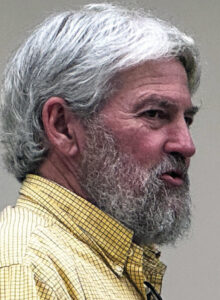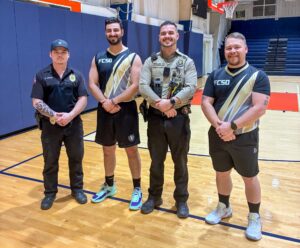PROGRESS 2024: Veteran Spotlight – Hugh Plott
Spending 30 years in the United States Army National Guard has given Hugh Plott, 51, a life experience or two.
Plott retired two years ago, after serving from 1991-2021. His military service began, funnily enough, on a dare. The Phil Campbell High School graduate was 19, working at the Franklin County Jail – his father, Larry Plott, was sheriff at the time – when he and a buddy saw a commercial for military service. They dared each other to join up – and they went to a recruiting office and did it.
From 1991-2000, Plott describes himself as a “traditional National Guard soldier.” He took part in weekend drills and summer training, and his unit assisted after natural disasters, taking on tasks like driving emergency personnel to their jobs through dangerous travel conditions. It was a good role and one that allowed Plott to continue working at the Franklin County Jail at the same time. In 2000, however, he transitioned to full-time active duty at the Russellville Armory.
Part of the 115th Signal Battalion, Plott has long described his unit as “kind of like AT&T for the Army,” instrumental in providing for communications. That role continued when his unit activated in December 2003 and, after a few months at Fort Campbell, Kentucky, deployed to Iraq from March 2004 to March 2005.
Plott said 119 men deployed from Russellville in the 115th at that time, part of a battalion of more than 500 – from Sheffield, Florence, Moulton and Haleyville. He said getting the orders to Iraq came as a little bit of a shock.
“You assume there’s no way you’re getting deployed. Even during Vietnam they didn’t deploy the National Guard units,” Plott said. He felt “kinda like everybody else. Nervous. A little scared. Knowing we were going to be away from our families – to me, that was the biggest thing.”
Plott had married his wife Sheryl in 1997. He had three young daughters at the time, two at home along with one from his first marriage. Now his girls – Kylee, Chloe and Hillary – are 21, 23 and 29, respectively, but when he first deployed, they were 7 months, 3 and 10. “I tell people all the time, it was rough on us as soldiers, but I think the families have a rougher time than we did. They had to carry on here,” Plott said.
Despite his initial surprise at deploying and his reluctance to leave his family, Plott said he was proud to serve. “I tell people even now, it’s a sense of duty,” he said. “I enjoyed serving my country, and I enjoyed serving overseas.”
Posted near Mosul, Iraq, Plott and his unit faced heavy attacks. “Iraq was probably the scariest deployment I’ve been on,” he said. “There were constantly rockets hitting the base. We had a lot of what they call ‘indirect fire.’
“We did have to go on the road and get from Point A to Point B, with a lot of IEDs … You’d lay down at night and wonder whether you’d wake up the next morning.” A suicide bomber blew up one of their chow halls in December 2004. “I think at the time it was the most deaths at one time during a certain time period.” Plott was there during the infamous Battle of Mosul 2004, in which insurgents nearly captured the city.
He remembers when the enemy was bombing the hospital right next to his barracks, and he remembers running for cover. He remembers walking along and seeing the guy walking in front of him get his leg blown off. He remembers praying fervently and counting on God’s protection to bring him peace.
In this first deployment – which would not be Plott’s last – he recalled they were using older equipment, still based on a relay model. They had to have line of sight between one antennae and the next to facilitate communications between different points. It gave the “AT&T of the Army” plenty to do.
Plott would deploy again from October 2011 to October 2012, to Afghanistan, stationed at the Kandahar Air Base, and from 2017-2018 to Kuwait with operations throughout the Middle East – Afghanistan, Qatar, Saudi Arabia, Iraq, Dubai.
In Afghanistan his unit was able to work with newer satellite equipment to provide communications. “We were able to spread it out more, and it didn’t take as many people,” he explained. “To be honest, though, it required a smarter soldier. Soldiers had to progressively be smarter to handle the more high-tech equipment.”
Compared to Iraq, his Afghanistan deployment, Plott said, “was not near as dangerous. We didn’t get but a couple rockets the whole time we were there, and we didn’t convoy much. If we needed to go somewhere, we’d get on a helicopter and go site to site.” Kuwait was also a safer deployment, as his unit was not in the primary combat zone. “We were kind of in the game but on the sidelines,” Plott explained.
Since his return home and later retirement, Plott said he has had to deal with the effects of PTSD as well as traumatic brain injury. He’s been plagued by panic attacks; one even made him sure he was having a heart attack. “You never really come back the same person you were when you left. You lose so much. It seems like you lose a little bit of yourself,” Plott said. “You’ve got to have a supportive family.”
The support he has experienced makes Plott reflect on the way Vietnam veterans were treated; he served with two men who had deployed to Vietnam. “It’s a shame, and shame on some of the people in our country back then,” he said. “Even if they didn’t agree with the war in Vietnam, these were still American citizens, and a lot of them were drafted – they didn’t even choose to go.”
Of course, between deployments while stateside, Plott continued his role in serving on the home front. Memorably, he was part of the response following the 2011 tornado. It hit close to home, literally: The storms wiped out his father’s and grandmother’s houses and killed three people on the road where he lives. He said of the many awards he received during his military service, it’s the one he got for his work in the tornado aftermath that makes him the proudest. “I really felt like, that’s what the Guard is for,” Plott said. “We took our satellites to four or five different areas in Franklin and Marion counties and set people up with phones and Internet … I think that was one of my proudest moments to serve – being able to help my neighbor.” Plott said because the Guard knows the area and the people, it can respond quickly.
Plott retired in November 2021 as a master sergeant. These days he’s contractor through SEIC for First Army. A dozen or so of his colleagues are also former military, with whom he served. He works in logistical support and equipment management for mobilization.
Plott said he definitely recommends the National Guard to anyone considering serving their country in the military. “Unlike some people say, I think it’s a good career. I think it builds character,” he said. “It provided a good life for my family.”
He has one grandson, 4-month-old Reed.







